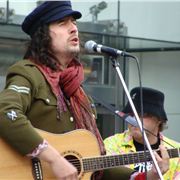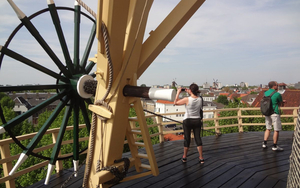FOR once buskers in Liverpool have been making all the right noises with the authorities.
And where there was once discord, there is harmony - at least for now.
A new "handbook", designed to promote sweet music between street artists and businesses in Liverpool city centre, is thought to be the first of its kind in the country.
The Guide to Busking in Liverpool is the work of the city council, the Musicians’ Union, the Keep Streets Live Campaign and the Business Improvement District.
The aim is to reduce the number of complaints from businesses in the city centre and lead to those which continue being resolved amicably. It also sets out the procedures for enforcement should this prove necessary.
Acts will still be able to use amplification, but within limits. They will also be able to display CDs of their material which, technically, passers-by can pick up for free.
It marks the official end to hostilities that erupted two summers ago when Liverpool City Council and BID attempted to push through a Draconian set of measures to curtail busking activity. These included a requirement for all performers = to obtain permits and public liability insurance, licensing of pitches and powers given to police officers to move buskers on if they didn’t think their performance cut the mustard.
Exposure
After a summer of litigation, the council threw the policy out, admitting it was unworkable, but not before papers were served by buskers at the High Court.
The story made national headlines and, if anything, the exposure increased the number of buskers in the city centre.
The new 12 page best practice guide advises buskers, council officers, businesses and residents on issues such as pitch selection, noise levels and the best way of resolving issues. A laminated advice card is also being produced which highlights guidance and recommendations.
 Jonny WalkerMorris Stemp, North of England Regional Organiser for the Musicians' Union, said: “The aim of the guide is to foster a vibrant street culture which allows for spontaneity whilst at the same time making provision for constructively resolving any issues that may arise, using existing statutory powers, and is an example I anticipate many will want to follow. It also blows apart the myth that busking is in some way illegal."
Jonny WalkerMorris Stemp, North of England Regional Organiser for the Musicians' Union, said: “The aim of the guide is to foster a vibrant street culture which allows for spontaneity whilst at the same time making provision for constructively resolving any issues that may arise, using existing statutory powers, and is an example I anticipate many will want to follow. It also blows apart the myth that busking is in some way illegal."
Councillor Steve Munby, cabinet member for neighbourhoods, added: “I think visitors to the city would be surprised and disappointed if they didn’t find a lively street music culture, given the city’s reputation. But we also know there are complaints from business and visitors about noise and obstructions so we have tried to balance the needs of all parties.
“I don’t mind making mistakes as long as we learn from them. We recognised that an imposed solution was never going to work so we have bought together a range of organisations to produce this guide. This has been a unique partnership which bodes well for the future of street entertainment. I’m really grateful to everyone who’s been involved.”
Buskers’ spokesman Jonny Walker, of the Keep Streets Live Campaign, said: It is right that buskers should be closely involved in decisions that affect them and it is to Liverpool City Council's immense credit that they chose to include the busking community at all stages in the production of this guidance.
“The busking community will continue to cooperate with the local authority to ensure the ongoing success of this new approach, and will hold a regular open buskers’ meeting which all are welcome to attend. We are confident that this guidance will help to harness the capacity of busking to transform the experience of shared public spaces in the city, and to continue to play its part in what makes Liverpool such a wonderful place to live, work and visit.”
While the Liverpool code is thought to be the first of its type, similar guidance has been issued in York and Cambridge.












